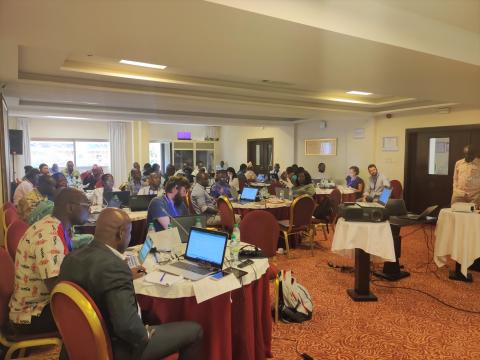
WAHO Collaborates With The Countdown To 2030 To Organize A Nutrition Data Analysis Workshop
Dakar-Senegal, 10-14 June 2019 - A WAHO team led by the Director of Healthcare Services, Dr Kofi Busia, is in Dakar for the Advanced Analytical Workshop under the Countdown Regional Initiative to Strengthen the Analytical Capacity and Evidence in Nutrition in West Africa. Other members of the WAHO team are Mr Tome Ca, PO for Health Information Systems, Dr William Bosu the PO for Non-Epidemic and Neglected Tropical Diseases, and Ben Traore of the WAHIT project. They are supported by Dr Serge SOMDA of the Nazi BONI University, Bobo-Dioulasso who is the Resource Person.
The five-day workshop, taking place on 10-14 June 2019, brings together health experts in nutrition and health information from the Ministries of Health and Research Institutions of the ECOWAS Member States, is being organized in collaboration with the Countdown to 2030 Consortium, which comprises Johns Hopkins University (JHU), WHO, UNICEF, Alive & Thrive, African Population and Health Research Center (APHRC), International Center for Equity in Health at Federal University of Pelotas, FHI360 and International Food Policy Research Institute (IFPRI).
The main objective of the workshop are to:
- Enhance evidence for nutrition interventions and coverage for women, children and adolescents in West Africa;
- Strengthen the capacity for analysis of nutrition data from household surveys (e.g. DHS, MICS, others) and other sources
- Consider pathways to translate evidence into programming and policy
At the end of 5 working days, the country representatives are expected to analyze their data to answer four following questions:
- What are the levels and trends in national and subnational indicators of nutrition coverage interventions and status among women, children, and adolescents in West Africa?
- Who are being left behind? What are socio-economic and geographic inequalities in nutrition coverage and status within and between countries in West Africa?
- What are the current policy and data gaps associated with nutrition measurement?
- What are the factors contributing to (a) present performance (good or poor), (b) progress over time, including socioeconomic and contextual factors, program and policy strength, intervention coverage
In his opening remarks, Dr Busia, the Director of Healthcare Services who represented the Director General of WAHO, Prof Stanley Okolo, welcomed all the participants and reminded them of the context in which the workshop is being held, which is the unacceptable levels of nutrition indicators in the ECOWAS region.
Available records show that between 2000 and 2017, unlike Asia where the numbers of malnutrition declined, the number of stunted children in West Africa increased from 15.1 million to 18.1 million. In addition, micronutrient deficiencies are prevalent, with 47% of children being deficient in vitamin A, and more than three-quarters of children under five years of age and 38%-57% of women in the reproductive age group having anaemia. Dr Busia pointed out that most ECOWAS countries are not on track to meet the World Health Assembly’s global nutrition targets by 2025.
He indicated that the non-availability or non-use of available data on nutrition hinders effective planning, prioritization and monitoring. He, however, stressed that WAHO has provided some opportunities to improve the situation. These include:
- Organization of the flagship, multi-stakeholder, biennial ECOWAS Nutrition Forum to review progress, coordination and share best practices on nutrition. The 15th Forum was held in Bissau in Oct 2017 under the theme “Nutrition surveillance - Towards improved planning and evidence-based decision making on food and nutrition security in West Africa”. The 16th edition will be held in Monrovia in Nov 2019 under the theme “adolescent nutrition”.
- Validation of the harmonized tertiary-level training curricula for nutritionists and for health professional schools. The curriculum emphasizes the importance of nutrition surveys and surveillance.
- Provision of technical support to countries in the use of the DHIS-2 – a multi-information platform for both routine and programme data.
He was confident that the workshop would allow all the stakeholders the opportunity to critically review the nutrition situation in the region to generate evidence and results that will be disseminated at the next ECOWAS regional Nutrition forum. He therefore urged all the participants to be fully engaged in all the training sessions to ensure that the set objectives are achieved.
He concluded by expressing WAHO’s gratitude to the Countdown to 2030 Consortium and its partners, notably WHO and UNICEF, for the continued confidence they repose in WAHO to lead the implementation of this project.
